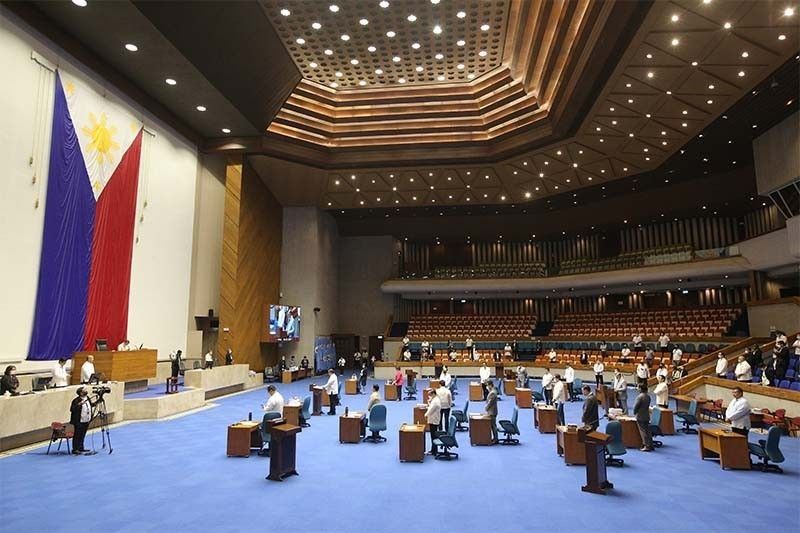Solon files reso for charter change, wants longer rule for president

MANILA, Philippines (Updated 2:55 p.m.) — Around three weeks before the start of the 19th Congress, Pampanga Rep. Aurelio "Dong" Gonzales Jr. (3rd District) filed a resolution calling to amend the Constitution so that the Philippine president can have a longer rule of two five-year terms.
Gonzales claimed that having a six-year term, which cannot be renewed, appears to not be enough for the chief executive to implement long-term programs and policies.
This comes shortly after Ferdinand "Bongbong" Marcos Jr. was sworn in as the 17th president of the Philippines. Gonzales is among the officials in the province who pledged his support for the UniTeam alliance, which Marcos Jr. and his running mate Sara Duterte-Carpio— who were eventually elected — ran under.
Gonzales' resolution calls on both chambers of Congress to convene in a constituent assembly to amend the law to allow the president to rule for a maximum of two terms— five years each.
"It is hereby proposed that the term of office of the President shall be five years with a re-election to another five-year term, a maximum of a ten-year term. Thereafter, the President shall be prohibited to be a candidate of any elective post," he said.
He also said that the vice president's term of service should be five years, with a chance of getting elected in the same post for another five-year term. The resolution allows the second highest official in the land to serve a maximum of two consecutive five-year terms.
Section 4 of the 1987 Constitution states that the president and vice president will be elected into office for one term of six years, which begins on June 30.
"The President shall not be eligible for re-election. No person who has succeeded as President and has served as such for more than four years shall be qualified for election to the same office at any time. No Vice President shall serve for more than two successive terms." -1987 Constitution
Gonzales’ proposal includes transitory provisions that bar the incumbent and past presidents from running for any elective position.
It also prohibits House members on their third and final term from running as district or party-list representatives in the elections after the ratification of the proposed constitutional revisions.
Likewise, local officials and barangay officials on their final terms will not be allowed to run for the same position in the elections after the ratification.
'Very short terms'
Gonzales said in his resolution that the President's current six year-term "appears to be insufficient" in establishing long-term programs and policies.
"We are now in our road to recovery having more than 12 trillion-peso national debt due to the COVID-19 pandemic and most recently the high prices of fuel due to the Russia-Ukraine War," he said.
Pampanga 3rd District Rep. Aurelio “Dong” Gonzales Jr. files a resolution on charter change, giving the president a term of five years with one reelection, instead of the present one term of six years. @News5PH @onenewsph pic.twitter.com/9vDUQdRg7u
— Marianne Enriquez (@mariannenriquez) July 1, 2022
"A long-term solution is wanting, hence a longer term policy on good and competent leadership should be put in place," he added.
It is for the same reason that Gonzales has also pushed for longer terms of office for congressmen, including both district and party-list representatives, as well as local elective officials, excluding barangay leaders. However, the resolution also said the officials should not serve for more than two terms in a row.
"The three-year term for members of the House of Representatives, past experiences would show, is a very short term...With the garganteum tasks given to Members of the House of Representatives, a need arises to increase their term of office from three years to five years but limiting them to only two consecutive five-year terms in office," he said.
Senators, who currently serve for six years with a chance of one re-election for a fresh term, were not covered in Gonzales' proposal.
'Strong' party system
The congressman's resolution makes a brief mention of strengthening the country's political party system, which critics have described as weak because there are no laws which penalize turncoatism- colloquially known as being a "balimbing."
"In every Presidential Election, a vote for the President shall be a vote for the Vice-President, provided that both belong to the same Political Party. This is to encourage a strong party system," he said.
Amending the Constitution is a form of charter change. President Marcos Jr. did not talk about his stand on charter change during the three-month campaign period starting February. But he said in a DZRH radio interview in January that pursuing charter change may be difficult as the public has historically viewed these as attempts by incumbents to remain in power.
Senator-elect Robin Padilla— who garnered the most votes in the senatorial race— is set to lead the constitutional amendments committee in the Upper House in the upcoming Congress.
Padilla has been supportive of charter change, and has constantly pushed for a federal style of government which basically involves the sharing of powers between two levels of government— national or federal, and the states or regional.
READ: With Padilla's election to Senate, is it time to talk about federalism again? — With a report from Xave Gregorio, Marianne Enriquez/News5 and One News PH
- Latest
- Trending





























